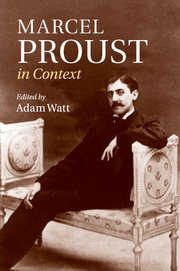Book contents
- Frontmatter
- Contents
- List of Illustrations
- Notes on contributors
- Figure I. Marcel Proust, portrait in oils by Jacques-Émile Blanche, 1892
- Preface
- Figure 2. Proust photographed on his death-bed by Man Ray, 1922
- Note on the text
- Chronology
- Part I Life and works
- Part II Historical and cultural contexts
- i. The arts
- ii. Self and society
- Chapter 14 Freud and psychoanalysis
- Chapter 15 Sexuality
- Chapter 16 Health and medicine
- Chapter 17 Technology and science
- Chapter 18 Religion
- Chapter 19 Travel
- Chapter 20 Journalism
- Chapter 21 Politics and class
- Chapter 22 The Dreyfus Affair
- Chapter 23 The First World War
- Part III Critical reception
- Further reading
- Index
- References
Chapter 15 - Sexuality
from ii. - Self and society
Published online by Cambridge University Press: 05 November 2013
- Frontmatter
- Contents
- List of Illustrations
- Notes on contributors
- Figure I. Marcel Proust, portrait in oils by Jacques-Émile Blanche, 1892
- Preface
- Figure 2. Proust photographed on his death-bed by Man Ray, 1922
- Note on the text
- Chronology
- Part I Life and works
- Part II Historical and cultural contexts
- i. The arts
- ii. Self and society
- Chapter 14 Freud and psychoanalysis
- Chapter 15 Sexuality
- Chapter 16 Health and medicine
- Chapter 17 Technology and science
- Chapter 18 Religion
- Chapter 19 Travel
- Chapter 20 Journalism
- Chapter 21 Politics and class
- Chapter 22 The Dreyfus Affair
- Chapter 23 The First World War
- Part III Critical reception
- Further reading
- Index
- References
Summary
Proust would doubtless have been somewhat horrified by his current status as an icon of gay modernism. À la recherche du temps perdu was the first major literary work in France to take on the issue of same-sex sexual relations directly and in an apparently objective manner. Its semi-autobiographical Narrator is heterosexual, just as he is non-Jewish, and his intense interest in both homosexuality and Jewishness (which he often treats as related and analogous phenomena) is presented as the product of an anthropological curiosity strictly devoid of any personal stake in these subjects. The representation of sexuality in the novel was, accordingly, greeted by critics as a courageously unflinching and objective treatment of a problematic subject, while in the later volumes, in which homosexuality takes on increasingly greater importance, the emphasis on alternative sexualities was often viewed as compromising the work's appeal to ‘universal’ experience. Proust was at once intensely interested in depicting same-sex relations and, given the opprobrium attached to the subject at the time, unwilling to identify himself – or his ambiguously autobiographical Narrator – as homosexual.
Sexuality is present from the opening pages of Swann's Way, in the form of a wet dream, with the mention of a woman born ‘from an awkward position of my thigh’ while the protagonist is asleep (1: 3, trans. mod.; i, 5). Later on in ‘Combray’ masturbation is mentioned in passing, as one of the activities in which the hero indulges in the privacy of an orris-scented water-closet lockable from the inside. The protagonist's sexuality – and Proustian sexuality in general – is largely masturbatory, and the importance of masturbation for the novel's conception may be gauged by an early version of the opening section, in which the phrase ‘à la recherche de’ makes its inaugural appearance in the form of a reference to ‘cette exploration que je fis alors en moi-même, à la recherche d'un plaisir inconnu’ [‘that exploration into myself that I undertook at that time, in search of an unknown pleasure’]. The suppression of this overt emphasis on solitary pleasure may have been the result not only of an effort to make the opening pages of the novel more generally acceptable, but also of the fact that masturbation was during the early years of the twentieth century still to some extent viewed as a highly pernicious activity, potentially leading to neurasthenia as well as host of other nervous ailments.
- Type
- Chapter
- Information
- Marcel Proust in Context , pp. 115 - 122Publisher: Cambridge University PressPrint publication year: 2013



